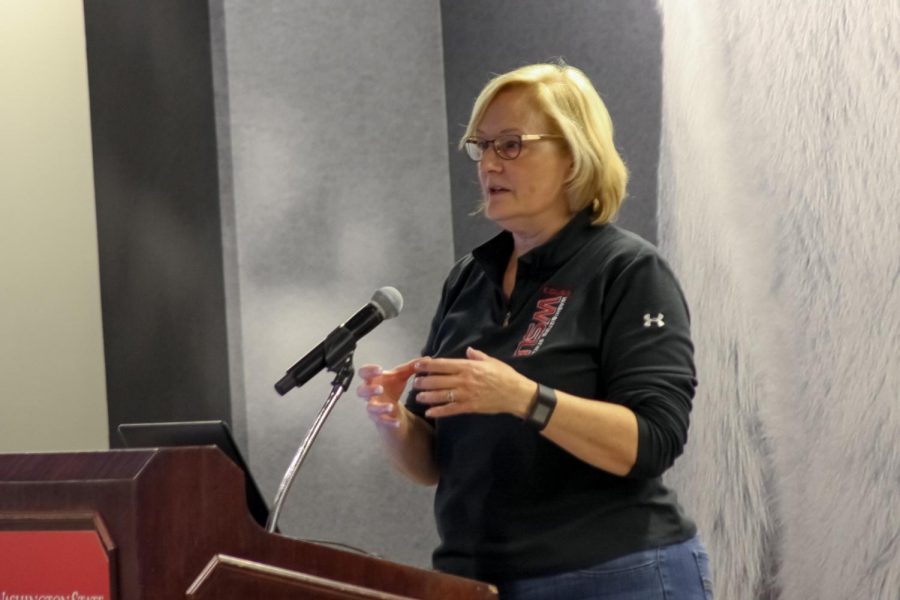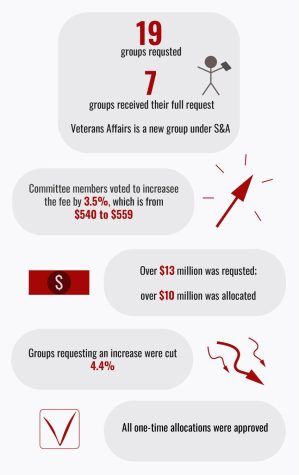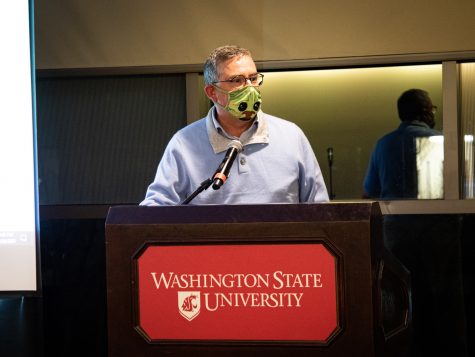GPSA discusses university budget, stipends
Payments do not allow for comfortable living, rent cost, students say
JACQUI THOMASSON | THE DAILY EVERGREEN
Guest speaker Joan King, newly-retired associate vice president and chief university budget officer, speaks to GPSA regarding WSU’s operating and capital budgets Monday evening inside the CUB.
October 23, 2018
Students discussed the university budget, new stipend proposals and possible changes to graduate students’ access at the Chinook Student Center and University Recreation Center at a Monday night meeting for the GPSA.
WSU budget
Joan King, newly-retired associate vice president and chief university budget officer, spoke to GPSA about the basics of WSU’s budget.
For the state appropriation and operating tuition, 85 percent of the budget went to people and benefits, she said. Only 15 percent of that budget went to operations, such as maintaining heat or light.
“This causes me to lose sleep at night,” King said. “We’ve always tried very hard to protect our faculty, staff and graduate students, but if we were to take additional cuts, then there’s not a whole lot of fluff left in that 15 percent.”
WSU provides a lot of jobs in the region, King said. If the university has layoffs, that will be problematic for the two counties surrounding the university.
In the 2014 fiscal year, WSU campuses spent more money than they brought in, King said, and this has continued over the past few years. Overspending from 2014 to 2017 totaled roughly $30 million, she said.
“The university is taking firm steps to recover from this place of spending more than we bring in in every year,” she said.
The university determined last year to rein in spending, King said. The 2018 goal was to recover $10 million.
“We actually recovered $22 million,” she said. “The targets [for the next year] are not yet set, primarily because we did so well the first year.”
They are not sure if they should keep the same goal of $10 million or whether they should only try to recover up to the $30 million deficit, she said, which means their target would be $7 million for the next fiscal year.
Each area, defined as a college, vice presidency or campus, had a target to reach for the 2018 fiscal year, King said. Part of the reason the university saw a much higher increase toward its target is because some areas got more revenue than anticipated.
The budget office is working to talk with representatives for each area to see if they will have the same revenue increase or not, she said.
Graduate student stipends
There are 115 stipend levels that can be paid at WSU. The minimum level for a master’s student is 26, which comes out to roughly $1,600 per month, with level 32 stipends used for Ph.D. students.
The WSU Graduate School recommends a minimum level, but it is up to a department whether it will abide by that or not.
“There’s a wide range that a graduate student can be paid depending on whatever department they’re a part of,” GPSA Vice President David Silva said.
Organization members are considering asking if the stipend levels for graduate students can be raised, but are only gathering information so far. If they want to increase the stipend the entire process could take up to two years, Silva said.
Some graduate students have said that stipend level 32 is not comfortably livable, he said. For example, it can be difficult to pay both rent and a car payment.
“It’s really on the line of doable for some of our students,” Silva said.
Chinook and SRC fees
In 1998, graduate students voted to pay the $157 fee for the Student Recreation Center. However, in 2015, graduate students voted not to pay for the Chinook fees, which means that they now cannot utilize the Chinook’s services unless they also pay the $98 fee.
A proposal GPSA is considering would allow graduate students to choose between the Chinook or the SRC and pay $157 for whichever one they choose.
“We’re going to do some of that information gathering now to see how many students this would impact, and then of course talk to UREC to see how that would impact the rest of the budget,” Silva said.

















